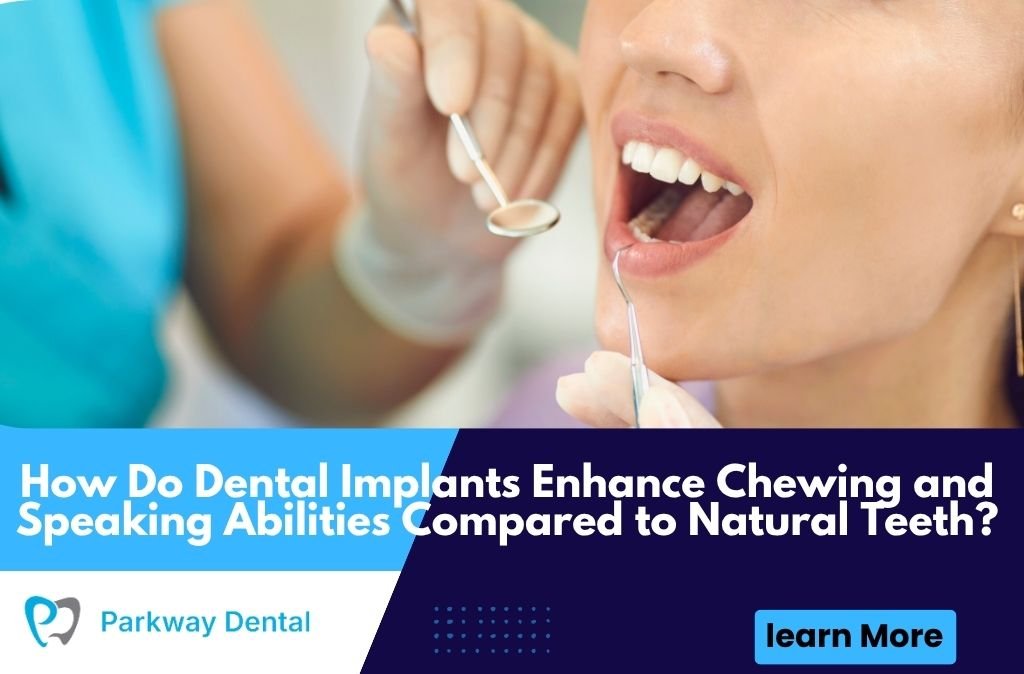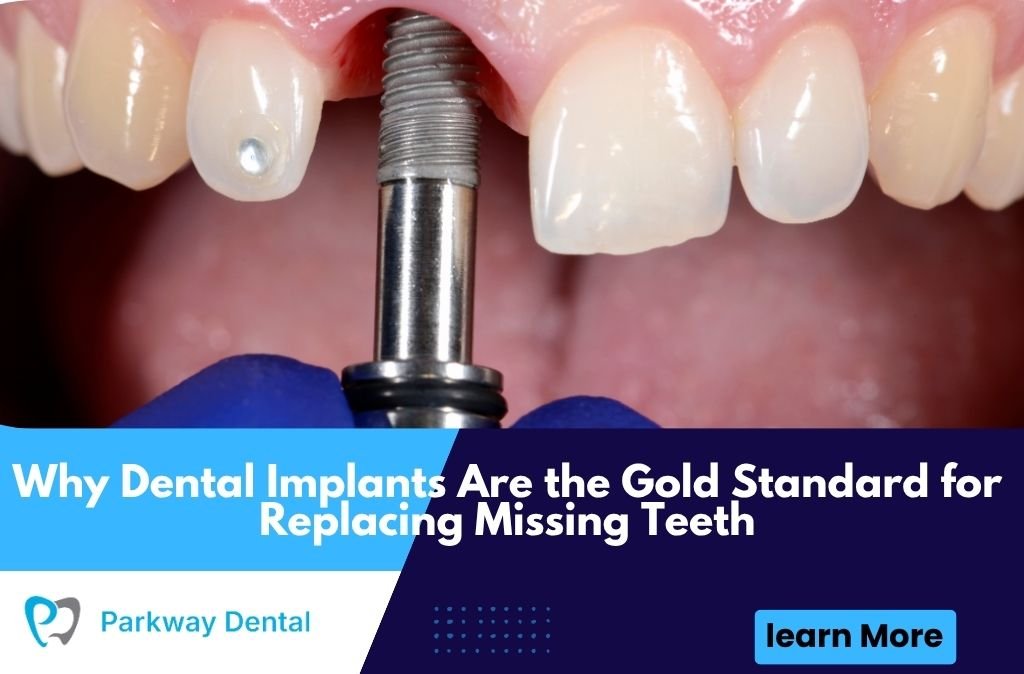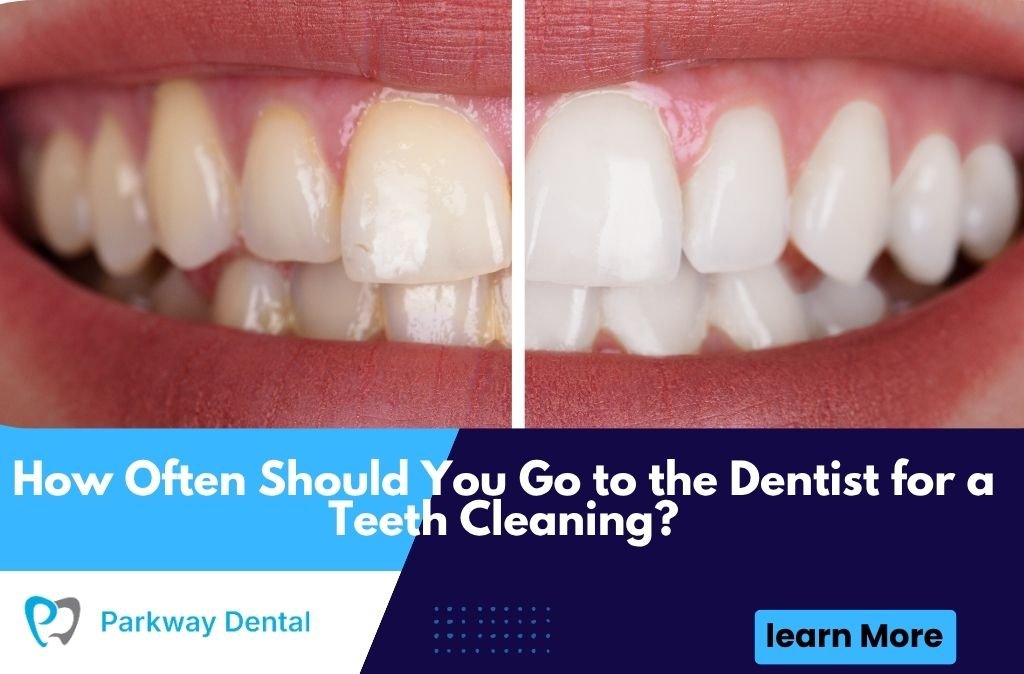Losing natural teeth can affect much more than your smile. It can change the way you chew, speak, and even how confident you feel. Modern dental implants have become the gold standard for tooth replacement — restoring function, comfort, and appearance that closely match natural teeth. But how exactly do implants improve chewing efficiency and speech clarity compared to traditional dentures or bridges? Let’s explore the science, benefits, and process behind this life-changing solution.
Understanding Dental Implants
Dental implants are small titanium posts surgically placed into the jawbone to act as artificial tooth roots. They fuse with the bone through a natural process called osseointegration, creating a stable base for a crown, bridge, or denture. Unlike removable prosthetics, implants become part of your mouth’s structure, providing unmatched strength and stability.
The Anatomy of a Dental Implant
A complete dental implant consists of three components:
- Implant Post – the titanium screw embedded in the jawbone.
- Abutment – the connector that attaches the crown to the post.
- Crown – the visible, tooth-shaped cap custom-made to match surrounding teeth.
This design mimics the structure of a natural tooth — root and crown — allowing implants to replicate natural function and feel.
Why Implants Are Different from Other Replacements
Traditional dentures rest on the gums and can slip, causing discomfort or difficulty while eating or speaking. Bridges rely on adjacent teeth for support, often weakening them. In contrast, implant-supported teeth are independent, durable, and permanent. They restore both form and function, making them the closest alternative to natural teeth.
How Dental Implants Improve Chewing Ability
One of the biggest advantages of dental implants is how effectively they restore your ability to chew. Missing teeth or unstable dentures make eating difficult, limiting food choices. Implants solve that problem by recreating a strong, stable bite similar to that of natural teeth.
The Science of Chewing Efficiency
When you chew, the roots of your natural teeth transmit pressure to the jawbone. This stimulates bone tissue, maintaining its density and strength. When a tooth is lost, that stimulation stops, and the bone begins to shrink. Dental implants replace this lost stimulation because they integrate directly into the bone, allowing you to bite and chew with nearly the same force as before tooth loss.
Restoring Bite Force and Jaw Function
Studies show that implant-supported teeth can restore up to 90 % of natural bite force, compared to only 20–30 % with traditional dentures. This means you can comfortably enjoy crunchy fruits, nuts, meats, and fibrous vegetables without worrying about shifting or discomfort. With stable implants, the jaw muscles work naturally, making chewing smooth and efficient.
Comfort and Stability While Eating
Unlike dentures that rely on suction or adhesives, dental implants are anchored firmly into the bone. This prevents slippage, irritation, or sore spots that often come with removable prosthetics. The result is a natural chewing rhythm — no awkward clicking, no fear of movement, just complete comfort and confidence.
How Dental Implants Enhance Speech and Clarity
Speech depends heavily on teeth and tongue coordination. Missing teeth or ill-fitting dentures can alter airflow and pronunciation, leading to slurred or muffled speech. Dental implants restore proper oral structure, allowing clear pronunciation and natural articulation.
The Role of Teeth in Speech
Certain sounds — like “s,” “f,” “t,” and “th” — require precise contact between the tongue, teeth, and lips. Gaps from missing teeth disrupt this contact, while loose dentures may shift mid-sentence. Implant-supported teeth fill these gaps permanently, restoring natural alignment for smoother, more confident speaking.
Preventing Speech Problems from Dentures
Removable dentures can slip or click when you talk, especially if they don’t fit perfectly. This not only causes embarrassment but also forces you to adjust your speech. Dental implants eliminate these issues entirely — they’re fixed, stable, and move exactly like natural teeth, keeping your speech clear and consistent.
Confidence in Public Speaking and Social Situations
Beyond mechanics, dental implants boost your confidence. Many patients who once avoided public speaking or social events due to fear of denture slips regain their voice — literally and figuratively. With implants, you can smile, laugh, and speak naturally without worry.
Comparing Dental Implants to Natural Teeth
While natural teeth are ideal, dental implants come remarkably close in both form and function. Understanding these similarities and differences highlights why implants are considered the best restorative option today.
Strength and Durability
Natural teeth are strong, but they’re susceptible to decay, infection, and wear. Dental implants, made from titanium and ceramic materials, are immune to cavities and resistant to wear. When cared for properly, they can last decades — sometimes a lifetime — outperforming most other dental restorations.
Bone Health and Support
Natural tooth roots stimulate jawbone growth. When teeth are missing, bone loss begins. Dental implants act as artificial roots, maintaining bone density and facial structure. This prevents the sunken, aged appearance often seen in long-term denture users.
Sensation and Feedback
Natural teeth provide sensory feedback through nerves in the roots, allowing precise control while biting. Dental implants, though they lack nerves, offer a similar level of function due to their firm anchoring. Patients report a nearly identical feel when chewing and speaking.
The Impact of Missing Teeth on Daily Life
Before understanding how implants restore function, it’s essential to see how missing teeth disrupt everyday life.
- Chewing difficulty: Hard or chewy foods become uncomfortable.
- Speech challenges: Sounds distort; dentures may slip.
- Bone loss: Jawbone shrinks over time.
- Facial changes: Lips and cheeks lose support.
- Confidence loss: Smiling or talking feels awkward.
Dental implants address each of these concerns — bringing comfort, confidence, and balance back to your life.
The Dental Implant Procedure: Step by Step
Getting dental implants is a structured, multi-step process that ensures long-term success and natural results.
Step 1: Consultation and Evaluation
Your journey begins with a thorough dental examination. X-rays or 3D scans help your dentist assess bone quality and oral health. Patients with good bone density are ideal candidates, but bone grafting can help those who’ve experienced loss.
Step 2: Implant Placement
During surgery, the implant post is inserted into the jawbone under local anesthesia or sedation. The area heals over several months as the titanium fuses with the bone — forming a secure foundation known as osseointegration.
Step 3: Abutment and Crown Attachment
Once healing is complete, the abutment is placed to connect the implant to the crown. Finally, a custom dental crown is fitted, perfectly matching the size, color, and shape of your natural teeth. The result is a tooth that looks, feels, and functions naturally.
Key Advantages of Dental Implants Over Other Options
While dentures and bridges provide temporary relief, dental implants deliver long-term benefits unmatched by any other solution.
Natural Appearance and Feel
Implants mimic natural tooth anatomy. Their lifelike crowns blend seamlessly, giving your smile a natural look. You’ll be able to eat, laugh, and speak without anyone noticing you have an implant.
Improved Chewing and Digestion
By restoring full bite strength, implants allow you to chew thoroughly, aiding digestion. Properly chewed food is easier on the stomach and helps with nutrient absorption.
Enhanced Speech and Pronunciation
With a secure foundation, implant-supported teeth let your tongue and lips move freely for natural pronunciation. There’s no slipping, clicking, or awkward adjustment — just clear speech.
Long-Term Jaw Health
Unlike bridges that require grinding down healthy teeth, implants stand alone and preserve natural structure. They stimulate the bone, preventing resorption and maintaining facial symmetry.
Dental Implants and Chewing Efficiency: A Closer Look
Clinical research consistently proves that dental implants outperform dentures in bite force and food breakdown.
The Physics of Biting and Pressure Distribution
Because implants are anchored in bone, they distribute chewing forces evenly across the jaw. Dentures, by contrast, place uneven pressure on the gums, causing irritation and limited function.
Dietary Freedom
After implant placement, patients can return to eating apples, steak, and crusty bread — foods once off-limits with dentures. This return to normal eating improves both nutrition and quality of life.
Comfort and Natural Feedback
Implant-supported restorations move in harmony with the jaw, providing realistic feedback during chewing. They feel stable, natural, and effortless.
Dental Implants and Speech Restoration: Detailed Analysis
Speech involves subtle coordination among the teeth, tongue, and palate. Missing teeth interfere with airflow and sound resonance, leading to mispronunciation.
Dental implants re-establish this natural harmony by restoring correct tooth alignment and spacing.
Clarity and Pronunciation
With implants replacing missing front teeth, sounds like “s,” “z,” and “th” become clearer. Patients often notice immediate improvement in enunciation and voice projection.
Stability for Speech Confidence
Dentures can slip mid-conversation, forcing people to limit their expression. Fixed implants stay in place no matter what, providing peace of mind in any setting.
Facial Support and Articulation
Missing teeth change lip position and facial muscle balance, affecting how words are formed. Implant restorations support natural facial contours, helping maintain smooth, confident speech patterns.
The Long-Term Benefits of Dental Implants
Beyond restoring chewing and speaking, dental implants offer lifelong advantages that protect your oral health and overall well-being.
Bone Preservation and Facial Structure
Implants stimulate bone growth and prevent the facial sagging often caused by bone loss. This keeps your appearance youthful and strong.
Longevity and Low Maintenance
With proper care, implants can last for decades — far longer than dentures or bridges. Regular brushing, flossing, and dental check-ups keep them in top condition.
Improved Oral Hygiene
Because implants don’t rely on neighboring teeth, they make cleaning easier. There are no wires or adhesives — just a routine similar to natural teeth.
The Emotional and Social Impact of Implants
A complete smile transforms more than oral health — it changes how you feel about yourself. Dental implants often restore self-confidence, encouraging people to smile and speak freely again. Patients frequently report improved relationships, careers, and overall happiness after receiving implants.
Caring for Dental Implants
Proper maintenance ensures your implants remain healthy and functional for life.
Daily Care Routine
Brush twice a day with a soft-bristle toothbrush and non-abrasive toothpaste. Floss or use interdental brushes to clean around implants and abutments.
Regular Dental Visits
Schedule check-ups every six months with your dentist to monitor implant stability and gum health. Professional cleanings remove any buildup around the implant base.
Avoid Harmful Habits
Don’t chew hard objects like ice or pens. Avoid smoking, as it slows healing and increases implant failure risk. A balanced diet rich in calcium and vitamin D supports jawbone strength.
Are Dental Implants Right for You?
Ideal candidates for dental implants have:
- Healthy gums
- Adequate jawbone density
- Good oral hygiene habits
- Non-smoking lifestyle
Even if bone loss has occurred, modern techniques like bone grafting and sinus lifts make implants possible for most patients.
What to Expect After Implant Surgery
Mild swelling or tenderness is normal for a few days. Pain is minimal and managed with prescribed medication. Within weeks, the implant begins to fuse with the bone. Once healed, you can chew and speak just as naturally as with real teeth — often even better.
Common Myths About Dental Implants
Myth 1: Implants are painful.
→ In reality, local anesthesia makes the procedure virtually painless.
Myth 2: Implants don’t look natural.
→ Modern crowns are custom-designed to match your teeth perfectly.
Myth 3: Implants require special care.
→ They require the same care as natural teeth — brushing, flossing, and check-ups.
Cost and Value of Dental Implants
While the initial investment may seem high, dental implants offer unmatched durability and health benefits. Over a lifetime, they are more cost-effective than repeated denture replacements or bridge adjustments. Most insurance plans now offer partial coverage for implant procedures.
Conclusion
Dental implants do more than replace missing teeth — they restore the natural functions that make eating and speaking effortless. By mimicking the strength and stability of real tooth roots, implants enhance chewing efficiency, speech clarity, and overall oral health. They also preserve bone, improve appearance, and boost confidence, giving patients a second chance at a natural, healthy smile.
At Parkway Dental, Dentist in West Roxbury, MA, we provide the best dental treatments** designed to restore function, comfort, and beauty to your smile.
FAQs
How long do dental implants last?
With proper care, dental implants can last 20 years or more — many patients keep them for life.
Are dental implants better than dentures?
Yes. Implants offer superior stability, comfort, and function, making chewing and speaking feel natural.
Do implants require special maintenance?
No. Maintain them like natural teeth — brush, floss, and see your dentist regularly.
Will I be able to eat normally with implants?
Absolutely. Implant-supported teeth restore up to 90 % of your original chewing power.
Is the procedure painful?
Most patients report minimal discomfort thanks to local anesthesia and modern techniques.
Do dental implants look natural?
Yes. Custom crowns match your existing teeth for a seamless, natural look.
Can implants help with speech problems caused by dentures?
Yes. Fixed implants eliminate slippage and allow clearer pronunciation.
Who is a good candidate for dental implants?
Anyone with healthy gums and adequate bone density is an ideal candidate.
What is the success rate of dental implants?
The success rate is over 95 %, making it one of the most reliable dental procedures available.
How soon can I get back to work after implant surgery?
Most patients return to work within a day or two with minimal downtime.





